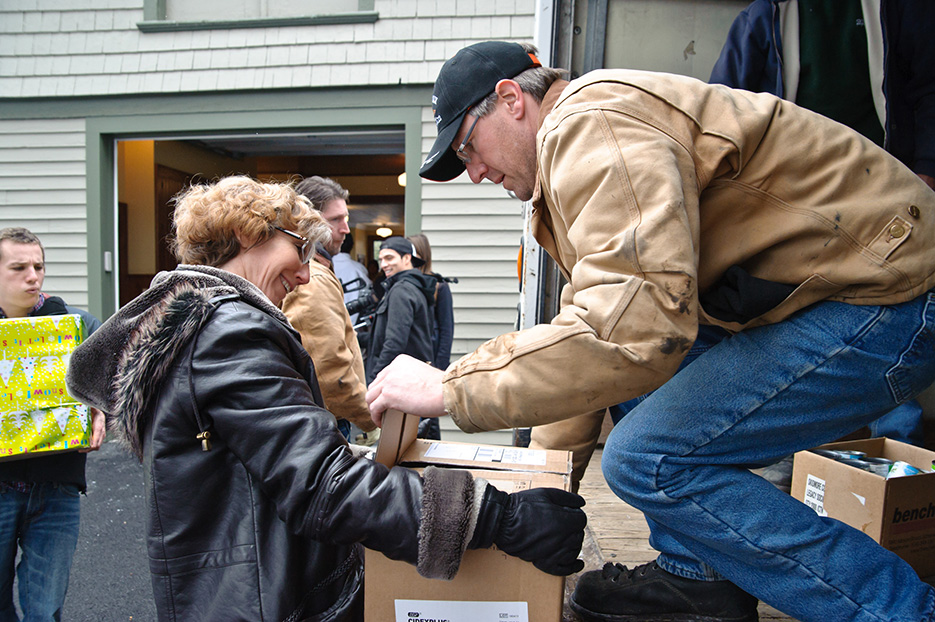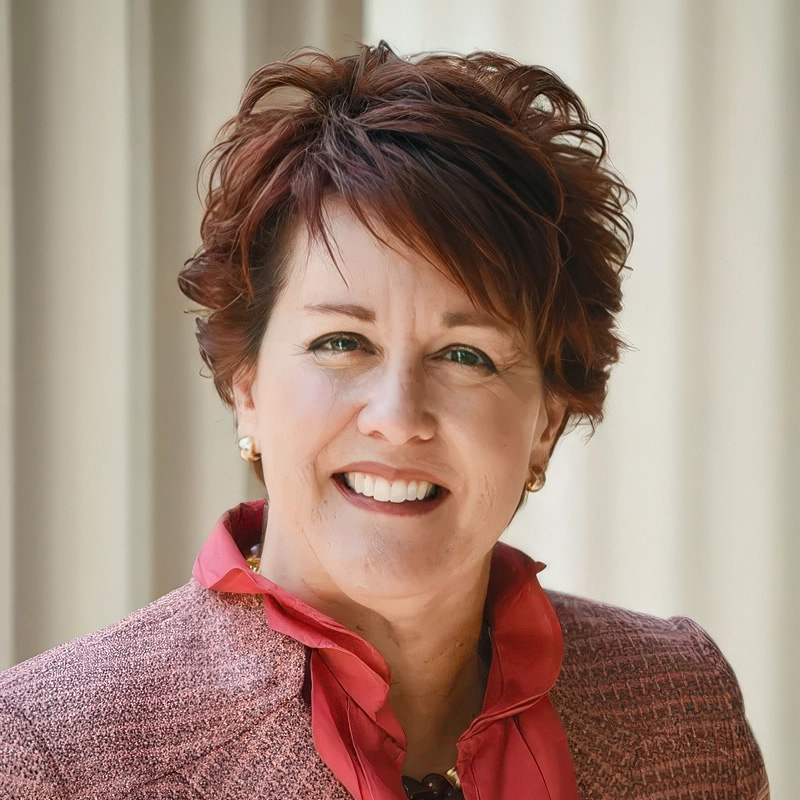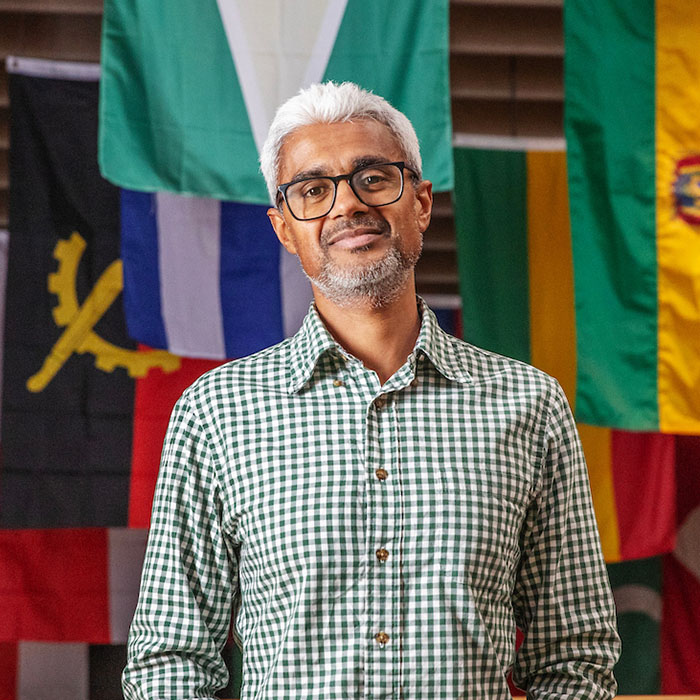1,000 students pay it forward

Approximately 1,000 Skidmore students participate in civic engagement projects, clubs or programs each year. Whether it’s serving grilled cheese sandwiches for world hunger or taking time out of their busy schedules to mentor or volunteer for dozens of local and national nonprofit organizations, our students inspire a culture of giving back at Skidmore.
In this episode of This is Skidmore, we hear Michelle Hubbs, director of community service programs, talk about the many ways Skidmore students make a difference for others.
Interview transcript:
Hubbs: My name's Michelle Hubbs. I am the director of community service here at Skidmore. I've been here for 17 years—which seems like a long time, but I have to say, it's flown.
Skidmore: I can imagine. I'm sure a lot of things have changed in your office over those 17 years.
Hubbs: Absolutely. I started as a part-time coordinator, 12 hours a week. As interest in civic engagement grew, I was moved to a full-time position maybe seven years ago.
Skidmore: So things have really changed on this campus then, in terms of student involvement and volunteerism. I guess a good place to start is, “What are they taking advantage of?” “What types of volunteerism are there for students to participate in?”
Hubbs: What's great about Skidmore is that it's very grassroots and the notion or desire to be involved in civic engagement activities is widespread.
For example, every single athletic team participates in some type of volunteer activity. We have service learning-classes and [applied civic engagement] classes. Our residential life [office] does a huge, beautiful event with Franklin Community Center and a Christmas gift exchange where they raise money and buy gifts. The athletics department does it too. There's also all the club and individual activities that students choose to do.
Skidmore: When students are participating in their clubs, is it like the chess club that decided to volunteer or are there also dedicated volunteer clubs?
Hubbs: There are dedicated clubs. Benef-Action is probably the oldest club on campus. They are an umbrella group with subgroups underneath them. Depending upon the interest of students, those subgroups can vary. What has always stayed is Saratoga Mentoring, Big Brothers, Big Sisters and Habitat for Humanity.
The students have also become very interested in working with Shelters of Saratoga. They will cook dinner for the clients there. Their work has also helped other clubs grow, like Feedmore, which collects unused food from the dining hall and take it down to Code Blue and the First Presbyterian Church twice a week.
When they started, it was kind of an incubation period. When the student has an idea, they can become a part of Benef-Action and have the benefits of being able to reserve space, reserve a car and have a budget. Then when they grow and get big and strong, they become their own club.
FeelGood is the same way. FeelGood now cooks grilled cheese sandwiches in Case Center.
Skidmore: Which are so good. I eat them all the time, and you're so close to them.
Hubbs: Yes, I can smell them. Let me tell you something: It's so hard not run down and get them. The money they raise from donations goes toward an organization to end world hunger.
We also have Special Olympic Swimming, which meets on Tuesday nights in our pool. That's a really great program, and we host the regional swim meet in April on campus. There’s also a dedicated UNICEF club that works with UNICEF International, following what their fundraising goals and interests are.
And we have a new Best Buddies Program that works with developmentally delayed adults. Best Buddies also has a larger international chapter. They’re actually kind of in a trial period right now because they've just started up on campus.
As one other example, we have Drastic Measures, an a cappella group that sings for charity.
Skidmore: Wow. The students are all over the place! We talk about this all the time on the show, that Skidmore students are not just involved in one thing.
Hubbs: Oh no.
Skidmore: Are you finding crossover between the clubs?
Hubbs: There is a lot of crossover. That's one of the things we try to help our students with—not doing so much. They get overstretched because they're so dedicated and passionate. But sometimes a student is interested in environmental conservation or food justice, so they’ll participate in both Feedmore and FeelGood clubs. There's a lot of crossover.
Skidmore: A lot of these clubs I haven't really heard of. Are they mostly new? Are they kind of ebbing and flowing with their membership?
Hubbs: They ebb and flow with membership, but FeelGood has been around now for probably three or four solid years. Feedmore was not active last semester because the student who really drives it was off campus. But she's back, and they're already up and running. So it depends.
For example, we had a student very dedicated to the American Red Cross who ran the Red Cross Club. He kept a very active club. But once he graduated, there wasn’t someone who wanted to take that role. I’m sure someone will in time. And we still offer two blood drives on campus and have added a third one this summer.
Skidmore: It kind of goes back too to the fact that Skidmore students are so involved across the board
Hubbs: Yes, they are.
Skidmore: Are a majority of our students participating in volunteerism?
Hubbs: Yes. I would say, roughly, you have a little more than 50 percent participation every year.
Because of our service-learning classes, athletics and what happens in residential life, plus what happens with clubs and individual student projects, I don’t even know about—there’s tons of participation.
Skidmore: Being right here in Saratoga, I imagine a lot of our students have a positive relationship with local groups. You mentioned Code Blue and other shelters around here, right?
Hubbs: We have a very good relationship with the agencies in town, which I am really proud of. I feel that the agencies know that when they need something, there's no hesitation to contact me or contact someone on campus because we will help.
And I feel completely comfortable calling anyone because a student has come into my office and they're looking for something. Maybe because they want to get some experience in what their major is or they want to get out into the community. We’ll talk about their interests, what their hope is, make some phone calls and usually find a placement.
Skidmore: Is that where your office comes into play? Are you kind of the connector and resource for these clubs?
Hubbs: Exactly. That's what I love about my job. I feel like I am here to make connections. For example, yesterday I got a call from Saratoga Center for the Family. In 2007, we painted a mural during pre-orientation in their basement outside their interviewing room. Sadly, they had a fire and it destroyed the mural. They called us, and Pro Arts Club went down and redid the mural.
But, just recently they had some flooding and there’s been some damage. They’ve called again saying, "Hey, can you get some students to come down and fix our mural?" That kind of stuff is great.
Skidmore: It’s nice to be so local. We really have that as an advantage. Students don't have to necessarily rely on their own transportation to get places.
Hubbs: No they don’t. And my office will pay for taxis. The bus is free if it's downtown. We really don't want them to feel they can’t be out there because they don't have a car.
Skidmore: You’d mentioned service-learning classes. Is that something that's relatively new here at Skidmore or something that's been around a long time?
Hubbs: Part of my position when I was hired was to support service learning. What has changed is the categorization. What we have now is “applied civic engagement classes.” Under that, we have service-learning classes and community-based research.
I can give you a really great example of one, 1,000 Books. With 1,000 Books, students meet once a week in the classroom and travel either to a child's home who can't get into the Head Start Program here in Saratoga or to Head Start to work directly with preschool children. It's all about the philosophy that if a child reads 1,000 books before they hit school, their success rate will be much higher. The students love it.
Skidmore: Wow. Yeah, I can imagine. You get the chance to work directly with folks in our community, especially kids. I know a lot of our students are so caring and they love working with small children in that age group.
Hubbs: Absolutely.
Skidmore: I can imagine that people are jumping to get involved. What’s the difference between civic engagement and service learning?
Hubbs: A community-based research class is where a class is actually doing research with the professor for the benefit of the community. It could be on the water, for example—what's happening with a local body of water and what its chemical makeup is. But with the service-learning class, students are put in contact with an agency where they are doing a project that meets the academic outcomes of the class.
With MB 360, students are paired with a company or an agency to do a marketing plan for them. The whole class is about marketing, but it's really hands-on because they get to do that for another agency in town. It's really beneficial and a great two-way street.
Skidmore: What a cool opportunity. We hear about student research all the time, but you don’t think about it with that civic engagement or volunteerism twist. You just think of it more of an academic opportunity. That's really great that students are participating.
Skidmore students are also participating in internships or part-time jobs or those types of things. Are there a lot of students who intern for nonprofits or are volunteering in the community?
Hubbs: Well, they certainly intern, but I'm not a person that would know all those numbers because they really come through the Career Development Center.
I will say that I serve on the Summer Fun and Internship Committee. We’ll get perhaps 150 applications every single spring for 50 spots. The majority of those applications are for students who are going to work for a nonprofit somewhere in the country. There are a lot of students that are doing internship work at nonprofits.
Skidmore: I'm not surprised to hear you say that, just based on the involvement and the number of clubs that we have on campus that focus on nonprofit work and volunteerism. It doesn't surprise me that our students are continuing and going into these fields.
Hubbs: Oh, absolutely.
Skidmore: You mentioned the Special Olympics and the American Red Cross as nationwide organizations that Skidmore supports. Are there others that students are involved with on a national scale?
Hubbs: I can answer that in two parts. In terms of clubs, Best Buddies is international, and UNICEF certainly is.
Also, one of the exciting things that's happened for us is we've become a member of Project Pericles. Project Pericles is a 20-member college/university member organization that helps people pursue civic engagement endeavors.
Being a part of that has allowed us to participate in larger national competitions for both our students and faculty. The Periclean Faculty Leadership Program is a program faculty are chosen to be a part of via the larger organization, and they receive a stipend for a project. It’s a really neat opportunity. For our students, there are competitions that give them the opportunity to travel to conferences large and small.
Skidmore: That's really cool. What is a volunteer competition like?
Hubbs: Well, it could be writing a letter to your government official about introducing a law. That would benefit the community, and it's very competitive.
Skidmore: Do our students participate yearly? Or is this new for us?
Hubbs: Last year was our first year, and students will participate again this year. It is very tough. It's nationwide and if you’re chosen, the conference and end competition are in Washington, D.C. So it's a big deal.
Skidmore: Does the law actually come? Does it go through or is it just kind of...
Hubbs: That I don't know.
Skidmore: Well, I hope to get back to you next time and we'll chat once our students win this competition. I'm feeling good. Can any student enter in this competition?
Hubbs: Yes they can, and they will work with a faculty mentor to complete that process and submit a really high-quality piece of legislation.
Skidmore: What a cool resume builder. Man, to be able to say, "Yeah, I successfully wrote this law," to participate in this competition. That's great.
Kind of switching gears … our students have civic engagement trips that they can go on, correct?
I think that's something that you don't really think about when you're looking at colleges. You don't think, “How am I going to spend my spring break?” “Am I going to go on this service trip?” Tell us a little more about this.
Hubbs: I started running service trips right after Hurricane Katrina. We’ve probably sent close to 80 students over the years specifically to Mississippi to participate in cleanup, replanting and rebuilding. That's been awesome. We've also had a variety of trips through Habitat for Humanity’s Collegiate Challenge. That's also been really exciting. Our latest trip was to Guatemala.
We have students who will come walk in my office and say, "I need to do something for spring break," and there are other options that individuals can do too. The Guatemala trip and these other trips were really Skidmore organized and supported. So that's important.
Skidmore: Are faculty members also heading down with them?
Hubbs: For this trip, yes. To go on the Guatemala trip you are required to take a 1-credit preparation class. So that's mandatory. You cannot go on the trip unless you do that.
Skidmore: What happens in that class?
Hubbs: It’s learning about culture and history. We really don't want to just drop you in the middle of a country that you know nothing about. You can't respect what's happening there if you don't have that information and knowledge.
Skidmore: So they're taking that all semester leading up to it.
Hubbs: Up to the trip.
Skidmore: What a cool opportunity. I can imagine it makes the trip a little more fulfilling.
Hubbs: Absolutely. When they come back, we do surveys or have our dinner to process it all and they all say, "This was so awesome."
Skidmore: How many students are going down on these trips?
Hubbs: This year we have nine that are going. Last year we had 12.
Skidmore: It’s very exclusive then?
Hubbs: They have to apply, and we get many more students that want to go than we can take. We really look to create as diverse a group as possible in terms of age, year, major.
Skidmore: That's a great learning opportunity for the students to just meet each other and learn from each other.
Hubbs: You forge strong bonds when you're hanging out in an airport for a long time, when you're on a bus, when you're on a six-hour plane ride or when you're up really early and all working toward the same purpose.
Skidmore: Do students have the opportunity over the breaks or even the summer to stay in Saratoga and volunteer as well?
Hubbs: Well sure. I know that students will stay on campus for a variety of reasons, and if they want to volunteer, then absolutely. There are a lot of opportunities at the Saratoga Race Course during the summer through BEST, the Backstretch Employee Service Team. As a matter of fact, my department volunteered at their Sunday dinner. We went over to the track and just did whatever they needed us to do to set up the dinner.
Skidmore: My last question is: where do you see volunteerism going at Skidmore? Do you see it growing?
Hubbs: I do. I think there are a lot of reasons to volunteer. Our students are so bright and understand that it's not just about helping someone else. We actually don't want them thinking “this is about me just doing good.”
Instead, they should be thinking “this is a two-way street and I am learning too. I am learning about my major. I am learning who I am. I am learning what my goals are in life. I'm learning about my values. I'm learning about why, as a community, we need this organization, what's missing.” That's growth.
Being out in the community means you've opened doors for yourself, you've changed who you are, and you're providing an opportunity for yourself just as you're providing an opportunity for the organization. Those are all wins. What I love about Skidmore is it has become really embedded in our culture.
Skidmore: It definitely seems like it. FeelGood, I see them out there all the time. You see posters for all these clubs on campus. The blood drive for the Red Cross … it just seems like it's part of the culture. If it was not there, it would feel strange.
Well, did I miss anything? Did I forget to talk about something?
Hubbs: No. There’s always so much to talk about. I would say that I appreciate Skidmore and the way that we have the freedom to support student interest.
Skidmore: I probably should have asked this now that you mention that about personal interests. Are the clubs that you mentioned coming from your office, or are these students coming to you and saying, "I want to start this? I want to make this a thing."
Hubbs: They'll come to me and say, "I want to make this a thing." When I go to them and say, "Make this a thing," it doesn't work because it’s not coming from within; it’s not their passion.
Skidmore: Well, it sounds like things are going great and it's awesome to hear. I'm excited to see where our students go beyond our community. Thank you for chatting with us today.
We do have a tradition on our show. We always ask our guest to say, "This is Skidmore," because we're telling our story. You can say it in whatever way embodies you the most. So, take it away!
Hubbs: This is Skidmore.


